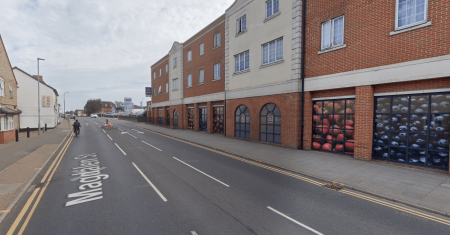Lindsey Owen, a 37-year-old mother of four, was found deceased in a private room at the Royal Stoke University Hospital in May. She had been staying at the hospital with her ill child, sleeping on a fold-up bed beside them. The discovery of her lifeless body was made by hospital staff during a routine check. Lindsey, a resident of Bold Street, Northwood, had a history of drug use and was undergoing treatment with prescribed methadone in an effort to overcome her addiction. However, CCTV footage revealed she had left the hospital premises the day before her death, raising concerns about potential drug use outside the ward.
An inquest into Lindsey’s death revealed her long-standing struggle with substance abuse, beginning at a young age. A toxicology report confirmed the presence of both prescribed medications and other controlled substances in her system at the time of death. This included a combination of heroin (or diamorphine), methadone, gabapentin, mirtazapine, codeine, and diazepam. The forensic pathologist, Brett Lockyer, concluded that the combined effect of these drugs led to respiratory depression, inducing a deep sleep from which Lindsey never awoke. The official cause of death was determined to be mixed-drug intoxication. Dr. Lockyer emphasized that Lindsey’s death would have been peaceful, describing it as drifting into a deep sleep without any awareness of what was happening.
Lindsey’s untimely passing left behind her four children and a grieving family. Her sister, Claudia, launched a fundraising campaign in her memory, sharing a moving tribute to her sister’s character. Claudia described Lindsey as a fiercely protective and generous person, always willing to go the extra mile for those she loved. She highlighted Lindsey’s inherent kindness and lamented the tragic nature of her early departure from this world. The fundraiser aims to provide support for Lindsey’s children and help cover the costs associated with her unexpected death.
The circumstances surrounding Lindsey’s death underscore the complex and often tragic nature of addiction. Despite her efforts to recover with the aid of methadone treatment, the allure of drugs ultimately proved insurmountable. Her story serves as a stark reminder of the devastating impact of substance abuse, not only on individuals but also on their families and loved ones. The support and compassion offered by her sister through the fundraiser highlights the importance of empathy and understanding for those battling addiction.
The image of Lindsey sleeping by her sick child’s bedside adds a poignant dimension to the tragedy. It speaks to the depth of her love and commitment as a mother, even amidst her personal struggles. The juxtaposition of her maternal devotion with the destructive power of addiction serves as a powerful commentary on the complexities of human experience. Lindsey’s story is a tragic reminder of the often unseen battles fought by individuals struggling with addiction, and the devastating consequences that can result.
The inquest and subsequent fundraising efforts offer a glimpse into the life and struggles of Lindsey Owen. Her story, while undeniably tragic, also serves as a testament to the enduring power of family and the importance of supporting those battling addiction. It highlights the need for continued awareness, compassion, and resources to address the ongoing crisis of substance abuse. Lindsey’s legacy, though marked by tragedy, may ultimately inspire greater understanding and empathy for those struggling with similar challenges.











